Anker Nebula Cosmos Projector review: a nebulous star in the making
The Anker Nebula Cosmos compact smart projector delivers more than you’d expect, and it’s a fantastic value if you’re looking to get into the smart projector trend
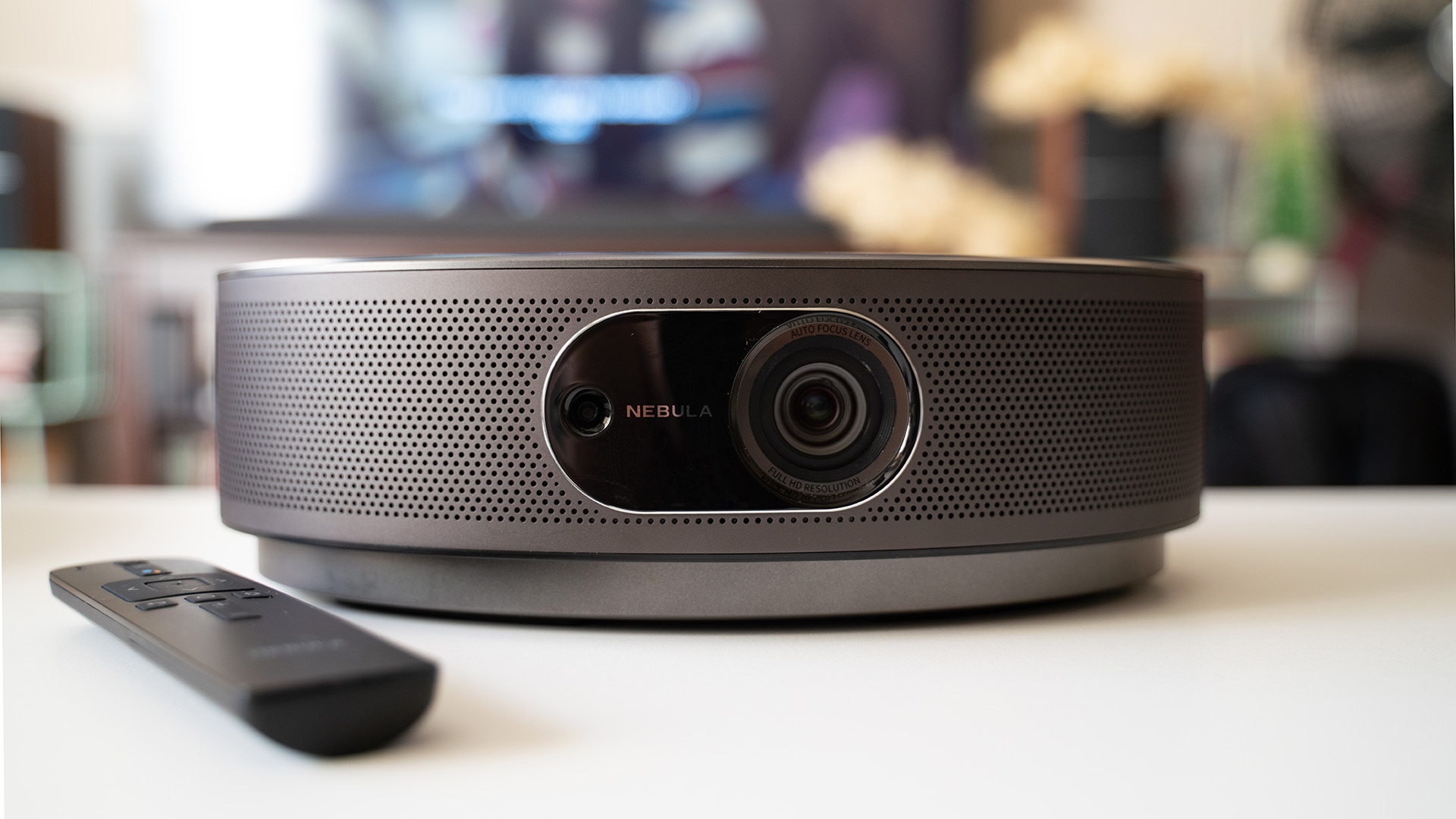
Halfway between a mini projector and a proper home projector, the Anker Nebula Cosmos projector delivers, touting great smart features, a snappy performance, and a fairly powerful set of pipes. It’s great the way it is. However, there’s still room for improvement.
-
+
1080p display resolution
-
+
Brightness at 900 ANSI lumens
-
+
Speakers are plenty loud and delivers a 360-degree sound
-
+
Has a remote app so you can control it on your phone
-
-
Slower to wake
-
-
Bigger than other portable projectors
-
-
Gets pretty loud and warm
-
-
No built-in battery
Why you can trust T3

With some very tough competition out there for the best projector, it’s tricky reviewing something like the Anker Nebula Cosmos, which sits in the mid-range segment of this new but growing market.
This smart projector from Nebula by Anker is a capable projector in its own right. And, while it doesn’t necessarily have that one marquee feature that sets it apart from the rest, it’s a great value option for those who are unwilling to splurge on a projector. It does, however, have a few rivals out there that are designed to truly impress, touting features that are missing here. And, for just a bit more money than what Cosmos is asking.
The Nebula Cosmos projector, therefore, feels like it’s sitting at a crossroads. There are things that it could do better, and there are things that could have been included. At the same time, considering its price tag and the features that it does have, it’s already great the way it is now.
If you’re looking for an excellent value smart projector that is compact enough to be portable and won’t burn a hole in your wallet, it’s definitely worth considering.
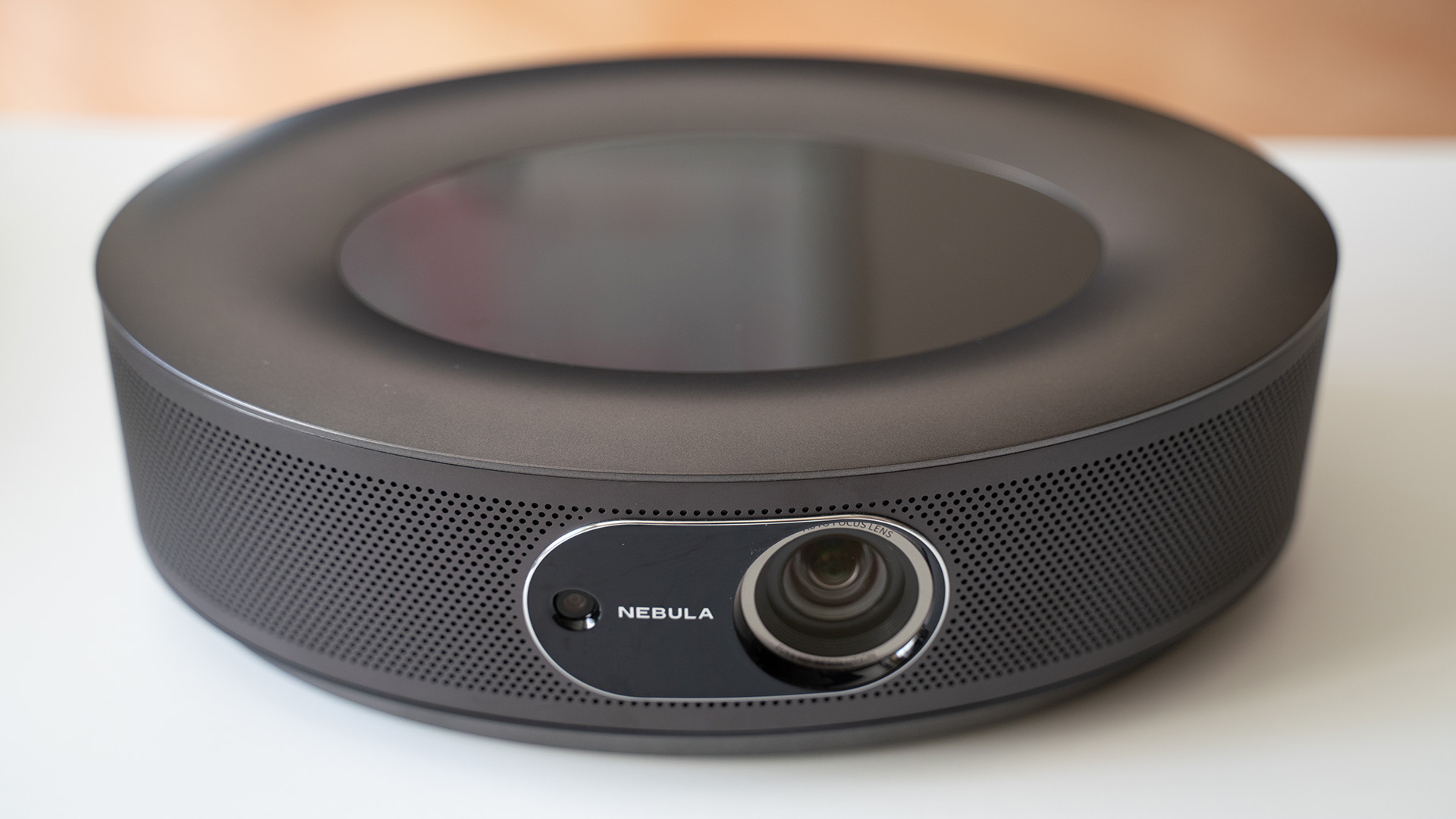
Anker Nebula Cosmos Projector review: price and release date
To begin with, the Anker Nebula Cosmos is a fairly affordable mid-range smart projector, setting you back $799.99/£799.99. That puts it in the same bracket as the more portable though tad pricier Xgimi Halo+ and the cheaper Xgimi Elfin that we recently reviewed.
Alongside its 4K counterpart, the Anker Nebula Cosmos Max, it hit the shelves in late 2020 and is currently available in the US and the UK. Unfortunately for Australia-based consumers, it’s not on offer in that region at the time of writing – although a couple of Anker Nebula’s mini projectors, the Apollo and the Capsule, are on hand as alternatives if you’re just looking for something portable.
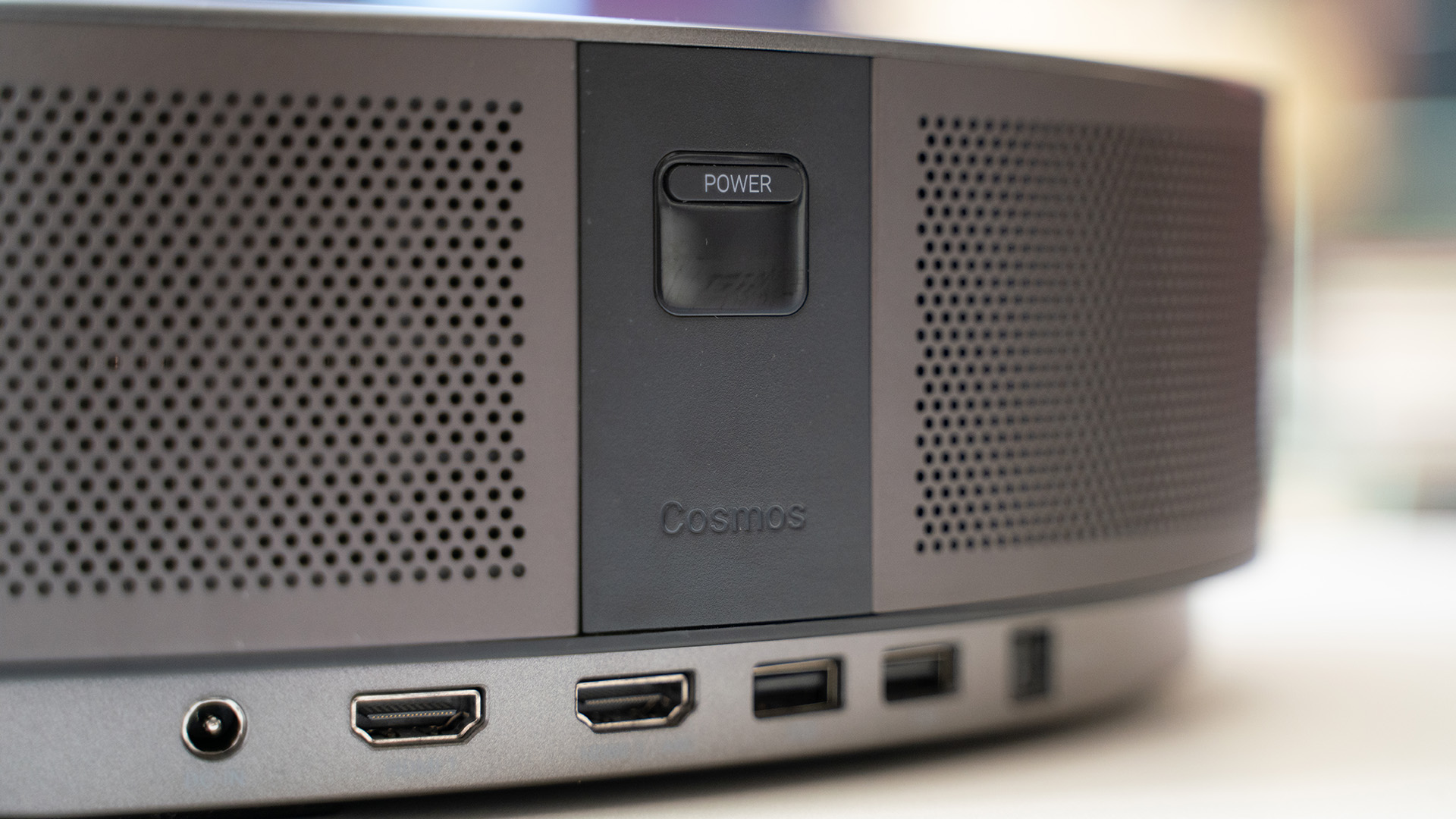
Anker Nebula Cosmos Projector review: design
You would not mistake the Nebula Cosmos for a mini projector. However, at 11.4 x 7.8 x 3.6 inches (29 x 20 x 9cm) and under 5 lbs (2.2kg), it is fairly compact and portable for a smart projector.
Get all the latest news, reviews, deals and buying guides on gorgeous tech, home and active products from the T3 experts
It’s portable and lightweight enough to be stuffed in a big gear backpack and taken with you on your daily commute. Not that a lot of people would, but that’s just to make the point that if you need a smart projector to use in the office for an event or a presentation, this wouldn’t be hard to take with you on the train. Of course, it also makes for an excellent travel companion when you’re going on a road or camping trip with loved ones or for outdoor movie screenings.
There’s a reason for the Anker Nebula Cosmos’ oval design. It boasts built-in 20W speakers that are designed to deliver a 360-degree sound experience. That means that it’s just as ideal for a group of people having a streaming party sans stand-alone speakers as it is for one person to use in their bedroom.
Aside from the small power button in the back, there are no other controls on the projector itself. All the controls you’ll find on the included remote, which comes with all the essential buttons, as well as the Google Assistant button and one for focus correction to fix the projector’s focus on-the-fly if, for some reason, the projector doesn’t automatically do it – though that only ever happened to me once during the course of my testing.
The remote uses both IR and Bluetooth to ensure the signal can reach the Nebula Cosmos from just about any position. I found it responded to all remote control presses even when the remote isn’t pointing directly at it. I have this projector set on the shelf above my bed only a few inches off the wall, and I’ve just always pointed the remote at the opposite wall where its projected image is. There’s never any issue or delay in responses. And, that’s with the projector only a few inches shy of its 10.43-foot recommended distance for its maximum 120-inch display.
Thanks to its shape, four elongated rubber feet, and weight, wobble is never going to be an issue here. This device is as stable as you can get, and as long as it’s mounted on something solid and steady – whether that’s a flat surface or a tripod – you won’t have to constantly worry about the auto-focus having to constantly readjust.
Yes, there is a tripod thread underneath right in the center, but considering its weight, you’re going to need a mount with a lot more heft to it, lest risking a fall and damaging the device.
In the back, just below the speakers, is a decent selection of ports – two HDMI 2.0 ports, one of which is an ARC, two USB ports, and finally, an optical audio cable for better quality audio if you need more oomph. Sadly, there isn’t a 3.5mm audio jack to connect your analog speakers.
Although this is a smart projector with the user-friendly Android TV powering it, these ports should give you other opportunities for connecting your media devices. If you’ve got your favorite movies on an SSD drive, for example, you can simply plug it in and rewatch them using this projector.
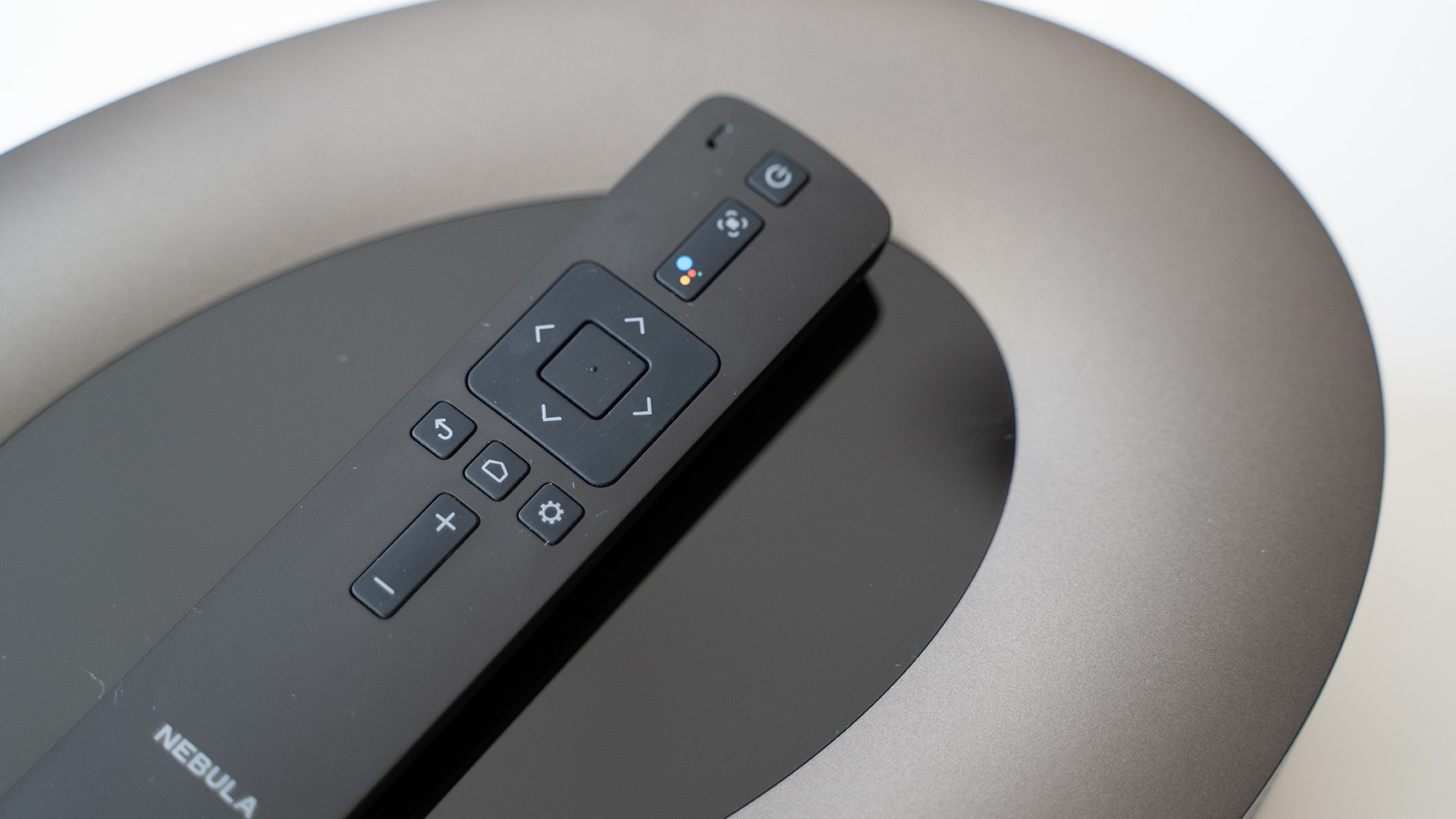
Anker Nebula Cosmos Projector review: features
The Anker Nebula Cosmos isn’t loaded with special features, but it does have one thing you’re unlikely to find in most portable smart projectors – those 360-degree 20W speakers. Set this projector up in the middle of the group, and everyone will pretty much have a largely similar audio experience, whether they’re behind it, in front of it, or at its sides.
Don’t expect amazing sound quality. These speakers sound boxy, like the audio is coming from a small box. The high end is a bit cut off, and so is the low end, which means it doesn’t have that deep low end you’d get from an actual sub.
Yet, the sound is actually not bad. There’s a lot of mids here, a decent amount of mid bass, which simulates low end rumble, and surprisingly a whole lot of volume. The soundstage also isn’t bad, although it’s not particularly wide, likely due to the fact the goal here is to let every viewer hear everything wherever they are in relation to the projector. If you want the best stereo image possible, the projector would have to be placed above your head.
If you want better audio, there’s always the optical cable as well as its Bluetooth 4.2 connectivity, which should more than suffice if you want to use a set of Bluetooth speakers or your Bluetooth headphones for all your late-night viewings.
There’s 8GB of storage space included here, but it doesn’t look like any of the available streaming services on the device offer the option to download shows and movies so it is a bit moot. Having the ability to download content from the likes of Disney+ and Amazon Prime Video would have made this device a lot more compelling. Unfortunately, there’s no built-in battery, which means you’ll have to find a power source if you’re using this outdoors.
One feature that does give Anker Nebula projectors an edge is the Anker Nebula Connect app. Available for Android and iOS, this app allows you to connect your Anker Nebula projector – in this case, the Cosmos – to your smartphone so you have another option to control it.
The Nebula Connect is essentially a remote control on your phone, which might feel redundant seeing as the device already comes with its own. However, it does give you a mouse pointer option and, more importantly, a text input with a keyboard section, which honestly makes searching for content a lot easier since you’re simply typing in your searches as opposed to painstakingly scrolling through a bunch of letters just to spell out the title you want.

Anker Nebula Cosmos Projector review: performance
Fitted with a Quad Core A55 Chipset alongside Quad Core Mali G31 graphics and 2GB of RAM, the Nebula Cosmos is sporting some aging internals (circa 2017 - 2018) – that is, in terms of components. But, you can hardly tell from its performance.
Yes, there are times when you’d find yourself wishing for a snappier performance. This smart projector is very slow to wake – so much so that you might find yourself pressing the power button again because you start to think it didn’t register the first press. And, there would be the occasional moment of lag when you’re scrolling.
However, you’ll find your experience with this projector a positive one. Beyond that sluggish wake, it’s generally quick to respond, whether you’re browsing the Android TV homepage, using Google Assistant to search for titles, or opening streaming apps. Admittedly, it takes a second or two to start streaming a video, but so do most TVs out there so this isn’t anything unusual.
What is unusual – or more accurately, unexpected – is how loud and warm the Anker Nebula Cosmos can get. The device itself doesn’t get hot. However, the immediate space around it does. And, it doesn’t just do that when it’s performing the more intensive tasks like playing a video. It actually starts like that upon waking, which is surprising considering its size and, therefore, space inside for effective cooling. This is kind of telling of how old its internals are.
That’s something you’ll easily get used to, of course, especially since you’re getting 1080p display resolution at a very bright 900 ANSI lumens. However, there are more compact projectors out there that deliver a snappier performance at the same resolution and a much larger display without being too loud or hot. The Xgimi Elfin is a good example of this.
Its max brightness level is great, though, especially for daytime usage. It also improves your viewing experience at night. There’s also HDR10 and HLG, but they’re nothing to write home about. If you’re looking for a proper HDR experience, you’ll want to look elsewhere. To be honest, I’m not seeing a massive difference in picture quality between HDR on and HDR off.
The size of the projection might disappoint as well, as there are more compact options out there offering a bigger display. However, 120 inches is plenty for small- to medium-sized spaces. Its keystone correction is kind of in the same boat. That is, the auto keystone correction isn’t really accurate, especially if you’re projecting it on a wall that’s not level. Plus, the quadrilateral manual correction is basic at best. However, it’s good enough to make the projected image sufficiently straight, even for someone as particular as I am.
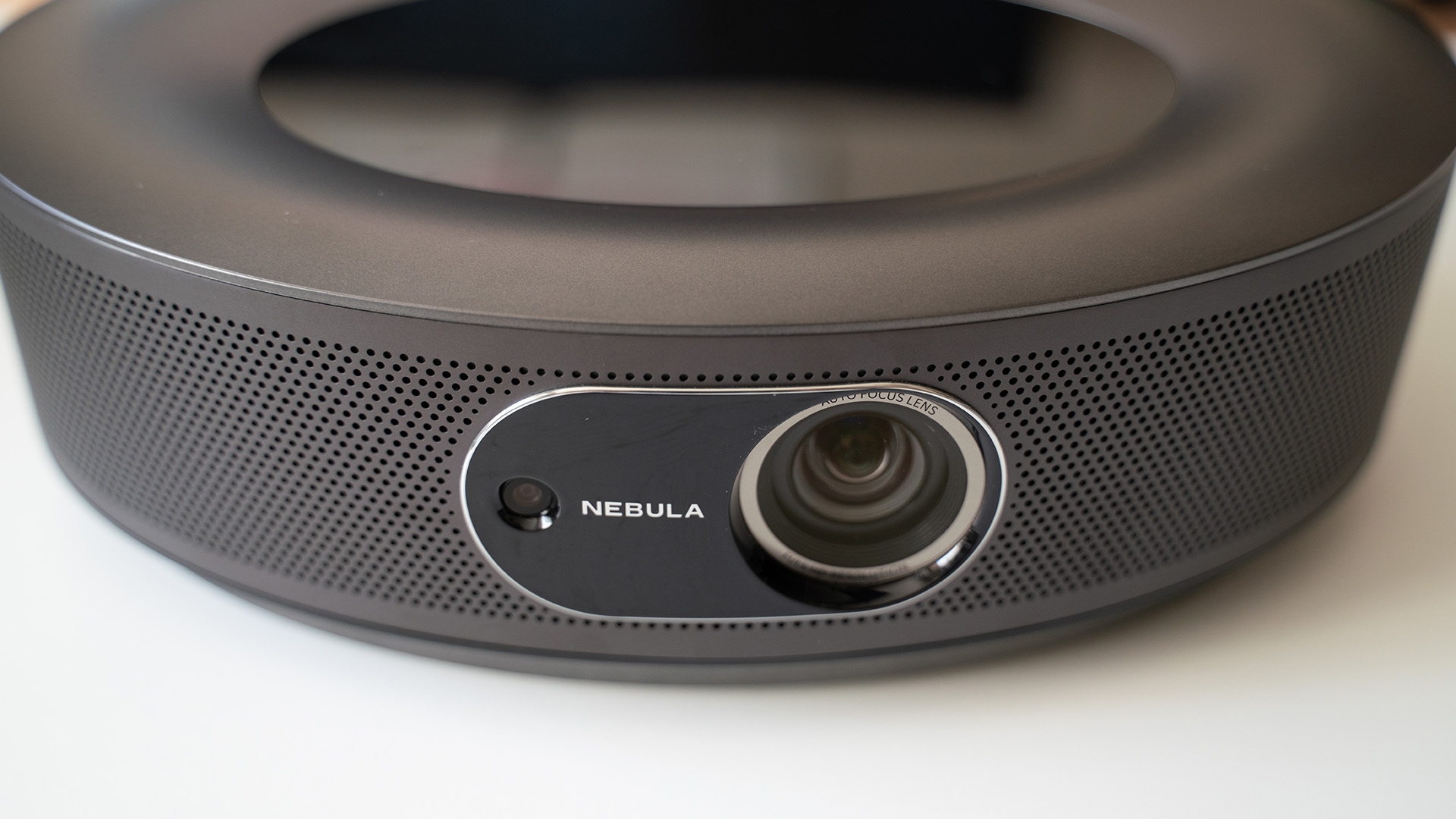
Anker Nebula Cosmos Projector review: verdict
Overall, the Anker Nebula Cosmos is what you’d expect from a mid-range smart projector. It may come with older components inside, but apart from the slow wake and the fact that it gets loud and warm, you’re getting a fairly snappy performance that’s more than good enough for streaming shows and movies, which is the main purpose of these devices.
You’d be hard-pressed to call any of its features an absolute stand out that sets it apart from all the other smart projectors out there – not even that 360-degree speaker that, while unique and loud, falls a bit short when delivering amazing sound quality. However, it still comes with many of the essential trimmings, including HDR, auto keystone correction, and 1080p resolution, as well as a couple of minor frills you won’t see on its rivals – namely, its brightness level and app support.
Although it’s too big to be truly categorized as a mini projector, it is compact and lightweight enough to be stuffed in a backpack or stored in the boot of your car if you need to bring it to work, a friend’s house, or for a camping trip.
Combine all that with its mid-range price, and it’s a great value smart projector. If you can afford to spend a little more, there are other options you should consider first before you make your decision. However, if you want to save some cash while still getting all the vital features you’d want from a projector, you should hit that buy button next to the Anker Nebula Cosmos now.
Also consider
I’ve pitted the Anker Nebula Cosmos against the Xgimi Elfin so much in this review simply because it’s its most direct rival of all the smart projectors we’ve reviewed. Both tout largely similar features, but if you want something that’s smaller, delivers a bigger image projection, and comes with slightly better executed features, the Xgimi Elfin might be more ideal. Especially because it is also slightly cheaper. Just bear in mind that its speakers are not very powerful and its brightness tops at 800 lumens.
If you can afford to spend a bit more, the Xgimi Horizon might be better suited, especially with premium features like 2200 ANSI lumen brightness, a 300-inch projected display, a set of Harman Kardon speakers with DTS and Dolby Audio, and more intuitive keystone correction technology – not to mention, an even faster performance.
Want 4K resolution? Anker Nebula’s Cosmos Max and Xgimi’s Horizon Pro are both worth considering. Just be prepared to shell out a bunch more cash as both are asking well over $1,000/£1,000.

Michelle Rae Uy is a tech and travel journalist, editor and photographer with a bad case of wanderlust. She is a regular contributor for IGN, TechRadar and Business Insider, and has contributed to Thrillist, Paste Magazine, Nylon, Fodor's and Steve's Digicams. Living mainly in California with her adorable cats, she splits her time between Los Angeles, London and the rest of the world.